In an orchard, the frequent passage of machines between the rows, always at the same place, will inevitably lead to soil compaction which can have major consequences on water drainage and on the surface part of the trees’ root system.
A good structure of the arable layer facilitates water infiltration, making it possible to reduce the number of trips back and forth linked to irrigation, but also preserve the soil’s biodiversity and avoid erosion.
Your machines’ tyres therefore have a key role to play, because depending on your pressure settings, the soil’s moisture content, the chosen tyre model for your tractors, the result may be very different in terms of soil fertility and yields in the medium and long term.
In this article we look at ways of minimising the impact of mechanisation in your orchards.
1. Preservation of soil to avoid compaction
With fruit growing, the first metre of topsoil is essential for your trees’ root development.
Soil compaction is therefore an aspect that will limit your yields. It is closely linked to the weight of your agricultural machinery and the inflation pressure in your tyres.
Other factors must also be taken into account such as the type of soil and the weather conditions.
In any case, you must control the impact of your machines’ agricultural tyres on your land to limit or reduce compaction, and thus improve your crop yields.
Avoid driving over soggy land
Whether during planting, fertilising or harvesting, soil compaction may worsen with every passage, in particular in wet conditions.
When your soil is waterlogged, it is highly unadvisable to use mechanical machinery in order to limit deep compaction. Soggy land has a low bearing capacity and your tyres will continue to sink until they find more resistance deeper down.
Ideally, you should avoid driving because this will increase the risk of soil compaction.
Limit traffic and the frequency of passages
With vines or fruit tree farming, the repeated passage of machinery between the rows is always in exactly the same place, without it being possible to drive further away from the crops. This encourages very localised soil compaction.
To limit the number of passages, you must reduce the weeding or irrigation operations by sowing inter-row cover crops which prevent the rapid heating of the soil, reduce compaction linked to machinery and improve natural water drainage.
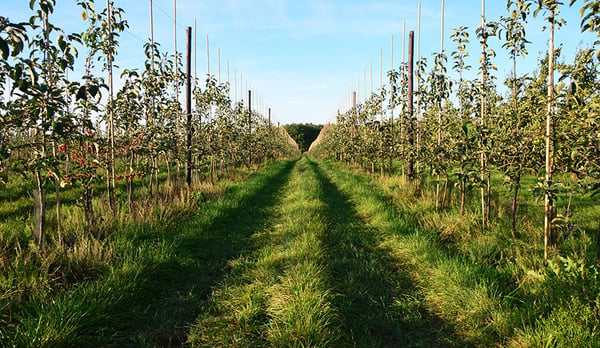
Limit the weight of the machinery
One of the main causes of soil compaction is the weight of the mechanical machinery, which has a major impact, especially when the soil is wet.
The choice of tyres as well as the pressure settings are important to compensate for the weight of the machines or trailers.
As a reference point, you should consider that the pressure within the tyre is about equivalent to the pressure transferred to the ground.
With heavy trailers or equipment, you will be obliged to increase the inflation pressure to avoid the tyres crushing under the effect of the weight, which would have a negative impact on the soil.
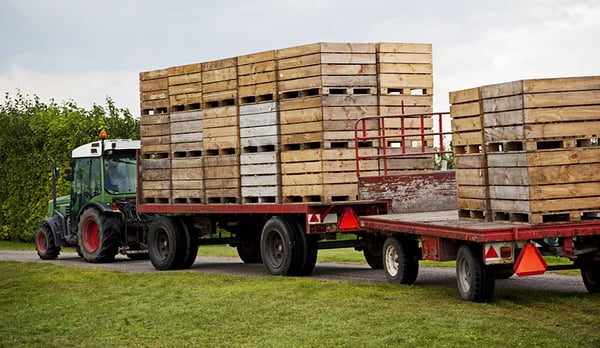
The use of a low-pressure tyre which will spread the load to the ground over a larger surface area is a good way to compensate for the weight of your equipment if you cannot limit the load.
Increase the land’s load bearing capacity by growing grass between the rows
Sowing grass between the rows is an excellent way to create an ecological niche and obtain passive soil protection.
This operation also helps to fight against erosion while reducing surface run-off.
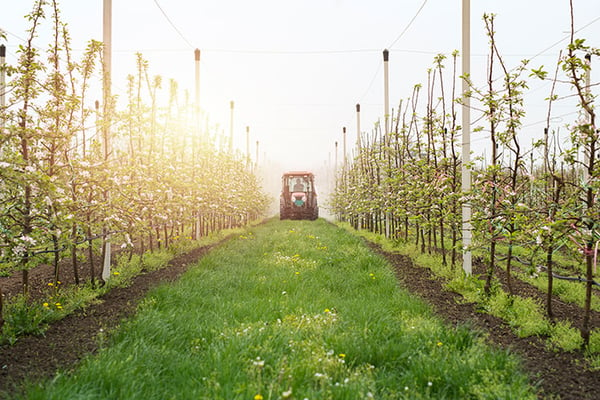
Basically, having grass cover improves the soil structure, because it has an unpacking effect, encouraging the permeability and porosity of the soil.
It can be temporary or permanent, spontaneous or sowed, depending on your objectives.
Whatever the case, it improves the soil bearing capacity (comfort for harvesting, pruning and treatment) while reducing the risks of compaction.
2. Prevent the formation of ruts
The repeated passage of agricultural machinery across the same spot encourages the formation of ruts, especially in wet conditions.
A rut is a deterioration of the surface soil, forming a more or less deep furrow.
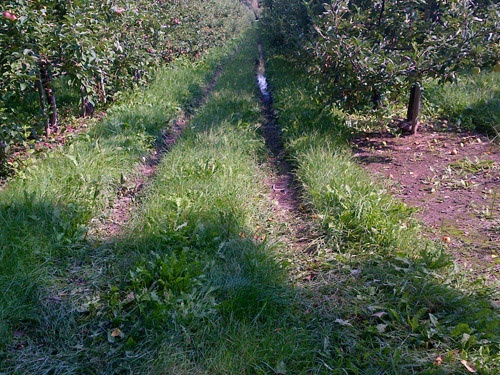
Ruts generally form when an agricultural machine or tractor exerts pressure that is higher than the ground’s bearing capacity. The wheels sink into the ground until the pressure exerted by the tyres and the ground’s bearing capacity balance out.
The formation of ruts is much quicker on wet ground, because the bearing capacity is low.
If water stagnates at the bottom of the rut, this is a sign of excessive compaction which blocks infiltration and accelerates erosion by concentrating rain water in the ruts. Unfortunately, this water is part of the soil’s deep reserves which cannot be replenished for the dry period.
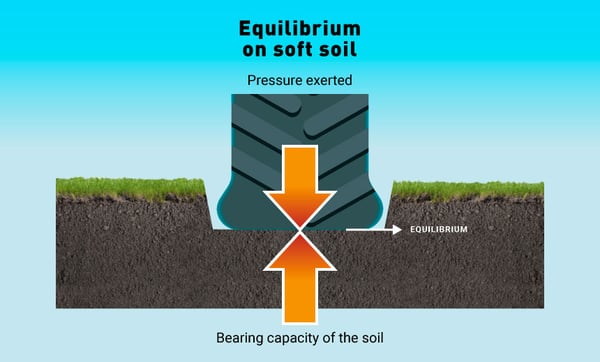
3. Preserve the moisture content to reduce the need for irrigation and limit the number of passages
The soil is made up of different aggregates, but also a large portion of air and water.
Good soil drainage is ideal for fruit growing.
Certain varieties such as cherry and peach trees are particularly sensitive to asphyxia at the foot of the tree and need good natural water infiltration to encourage root development.
When the soil is packed down, this reduces the water infiltration capacity, which means that more irrigation is necessary, costing more and requiring more trips across the land with your machinery, which aggravates soil compaction further.
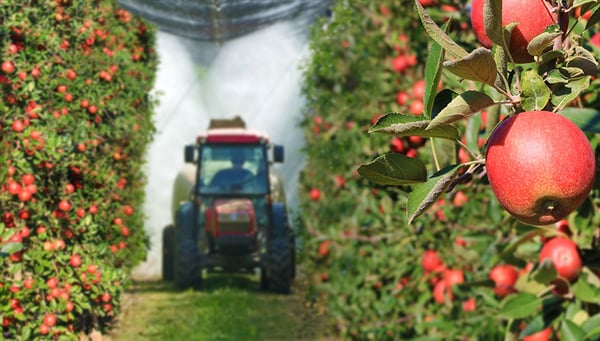 Irrigation of orchards
Irrigation of orchards
Cover crops or mulch solutions
Grasses are in competition with your crops to capture water reserves and nutrients, which could lead you to believe that bare ground is better adapted to your orchard.
However, cover crops are a perfect way of:
- avoiding erosion,
- improving drainage,
- fighting against compaction,
- preserving the moisture content necessary in the soil’s upper layers.
If you plant cover crops with a root system that does not go deep, such as perennial ryegrass, you will block the development of weeds.
A permanent cover crops is an advantage because the soil does not require tilling which reduces the number of passages required by your machinery. It is also perfectly suitable for apple, pear or plumb growing.
The advantage of mulch is that there is no competition between crops for water reserves, and it acts as insultation both in winter and summer, preserves the soil’s moisture content and blocks the development of grasses. It reduces the number of machine passages and has less impact on soil compaction. The disadvantage is the proliferation of rodents which necessitates laying traps and protection for the base of the tree trunks.
4. Working with low power and wide tyres
The choice of tyres depends on your soil characteristics.
For orchards, you should opt for agricultural tyres that can work at low inflation pressure. The soil footprint will be much larger, which allows the weight to be spread over a bigger surface area, thus increasing the bearing capacity and limiting compaction.
Firestone has developed the R4000 tyre designed for vines and orchards which satisfies these requirements exactly.
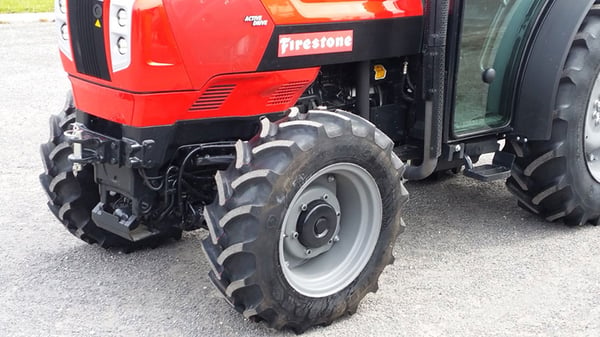 FIRESTONE’s vine and orchard tyres
FIRESTONE’s vine and orchard tyres
Here are the main advantages of Firestone’s R4000 agricultural tyre:
Improved traction
The tyre has involute lugs designed to optimise tractive force on the ground. Their specific design helps reduce soil disturbance. Their profile angle encourages self-cleaning, while reducing the risk of slip.
Robust design
The R4000 tyres have a reinforced structure, in particular at the level of the casing, the sidewalls and the tread. Their anti-wear compound offers a very long lifespan. Their innovative design means that they can operate at low pressure with heavy loads, without compacting the soil.
Time saving
No more time lost with these improved flexion tyres. You no longer have to adjust air pressure each time you change type of soil, because you can drive with the same inflation pressure on the road and in the orchards.
Higher load capacity
Firestone’s low-pressure R4000 tyres allow you to work with a heavy load and a lower inflation pressure to avoid soil compaction. Their solid casing means that they can operate at a pressure of between 0.6 and 2.4 bar.
To crown it all, they offer driving comfort and optimal safety while limiting the creation of ruts. This is therefore an excellent solution if you wish to preserve your soil, increase your productivity and reduce your operating costs.
For more information on tractor tyres
With Firestone, you have the guarantee of tractor tyres that deliver a real advantage, and that in choosing our brand, you can work worry-free.
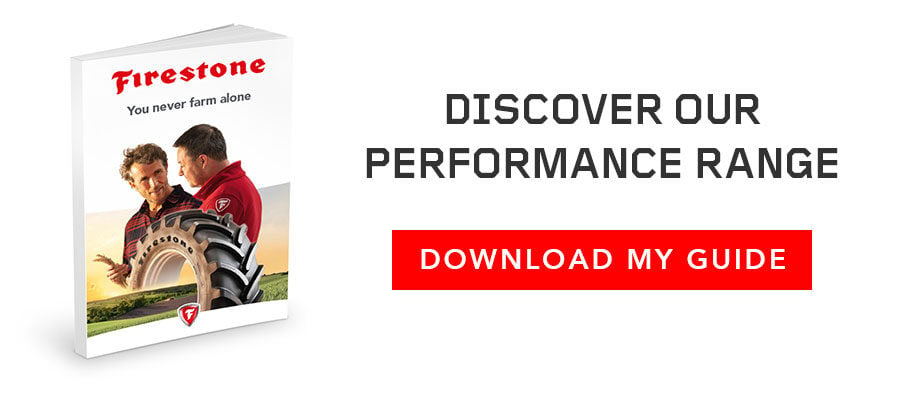
Most people who read this article have also read some of the following articles:
This information is intended only to make you aware of the technical and functional aspects of agricultural tires and their use. It does not allow you to make a judgment or a definitive conclusion on a given problem. Only your agricultural tire expert is able to make a technical assessment and take a final decision, case by case.